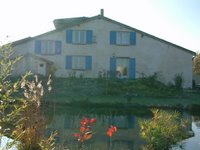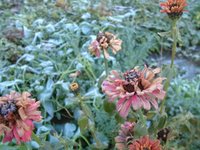The blue in burgundy
Burgundy as a color is a lusciously rich blend of reds and blues. Burgundy, the place, leans more towards the blue, at least at present.
Burgundy, the place, leans more towards the blue, at least at present.
The English, who first adopted sunny Provence with its undemanding lifestyle and languid vegetables that easily tend to over-ripen, have lately been buying up old farmhouses and under-performing vineyards further north. They have brought a passion for blue with them.
From the hills of Beaujolais to the lamb- and cow-dotted pastures of Charolais, the dream of the perfect country home, preferably à la française, is alive and well.
Much of the French countryside 20 years ago was in a sorry state, with crumbling walls and boarded doors and shutters that had rusted closed: the French had moved to the cities. Ghost towns and middle France were becoming synonymous. Today, thanks in part to the English invasion, pockets of the French countryside are being improved, and if the European Union holds together, it might have something to do with undercurrents of a cross-cultural love affair. For the British love traditional France, and they are determined to save it. The French watch in amusement, particularly as the price of land rises.

Evelyn Ralph's blue stoneware, near Charolles
Owning a British country home in France requires blending the dream of the house with indulging other passions. In Roger's case, it would be nice to have a steam train running around the garden, but that is for tomorrow or next year. Meanwhile, there is cooking and wine and gardening. In the case of the friends we will visit after Beaujolais, it is pottery.
A traditional French country home often has all have all of the above except the train and the crafts. And the white or brightly painted walls loved by the British are covered with flocked red and gold wallpaper. Two wonderful examples of the British influence on the French countryside were our destination for the weekend. Sarah and Roger run Robert Ash's Cookery School on the edge of the Beaujolais region, a few minutes south of Macon. Their home is a blue-shuttered old homestead on a hectare of land. It sits, perched above the flood line, a couple hundred meters from the Saône River at a point where it broadens and heads for Lyon, there to join the Rhone. Looking closely we see that it is made of mud, pisé in French, a remarkably strong building material. The next day, on a walk to counterbalance dinner's bounty, Roger points out an empty house. One wall has clearly visible builder's holes, perhaps 200 years old, which are are now home to starlings and sparrows. They were originally poked in the fresh mud to hold the rods that held the scaffolding that allowed the men to create the next floor up.
Two wonderful examples of the British influence on the French countryside were our destination for the weekend. Sarah and Roger run Robert Ash's Cookery School on the edge of the Beaujolais region, a few minutes south of Macon. Their home is a blue-shuttered old homestead on a hectare of land. It sits, perched above the flood line, a couple hundred meters from the Saône River at a point where it broadens and heads for Lyon, there to join the Rhone. Looking closely we see that it is made of mud, pisé in French, a remarkably strong building material. The next day, on a walk to counterbalance dinner's bounty, Roger points out an empty house. One wall has clearly visible builder's holes, perhaps 200 years old, which are are now home to starlings and sparrows. They were originally poked in the fresh mud to hold the rods that held the scaffolding that allowed the men to create the next floor up.
The school is a relative newcomer to the tradition of English cooking schools in France. It features a chef who was making a name for himself in Britain as a musician and songwriter when he won a BBC television competition for young chefs. He then opened a trendy eating spot, The Blythe Road Restaurant, in Olympia, central London.
Roger and a partner had an advertising agency nearby and Roger became a regular customer, watching Robert's fan club grow daily.
What more natural than to keep the cooking fires alive by putting the old French house at the disposal of budding chefs who want to know the secret behind Robert's deep red onion marmalade and other specialties?

November is the down season in the cooking school business, and we spent a night in the house, enjoying chef Sarah's cooking skills and Robert Ash's recipes, as well as Roger's wine cellar favorites. He published the international success, The Wine and Spirit Diary, for 20 years before retiring last year. An orange moon rose over Sarah's pond, which serves as swimming pool and home to goldfish in the summer. Sarah's reading and reflection chair are empty and forlorn in front of the pond. This is the last day the flowers will hold their color, having been touched by the first frost. Already, they are strawlike to the touch.


The day after the first frost.

We learn lesson one in creating a charming English house in the French countryside: nothing is as simple as it looks. The pond has been home to two types of frogs, one a smallish and charming French variety and the other an import with a loud bark (the reader is not encouraged to make political parallels).
No one can live with these frogs, so Roger and others have taken air rifles to the pond to reduce the unfriendly frog population. But the pond has a black plastic liner, so the hunters need to have an excellent aim or they will kill the pond rather than the frogs.
A reasonable number of reasonable frogs is a good, rather than bad thing, and the fish help keep the balance. Goldfish have shared the pond with the frogs for some time, but Roger now brings in black bass, which are supposed to eat the tadpoles and baby frogs. "If they don't get enough tadpoles, I'll have to put in smaller bait fish to keep the black bass fed." Visiting heron sometimes eat the large fish, not a sight for chefs in training. Unappetizing. If a fish is too large to pluck and swallow in one go, the heron pokes at it until it is dead. "As my neighbour says very often, 'C'est très compliqué en France,'" Roger points out.
 Sarah and Roger's large country kitchen (one of two, for the cookery school) and roaring fire are a comfort. We head for bed, to one of the cozy rooms reserved during the season for the aspiring chefs.
Sarah and Roger's large country kitchen (one of two, for the cookery school) and roaring fire are a comfort. We head for bed, to one of the cozy rooms reserved during the season for the aspiring chefs.
The moon rises higher, frost covers the land, harder this time than last night. I run a warming bath, and watch the water pour out of an elephant's head, a quintessentially British touch of civilization.
Out there it's a jungle. In here we tweak friendly elephant ears for our baths.
Tomorrow: Charolais country and a potter's dream home.



0 Comments:
Post a Comment
<< Home